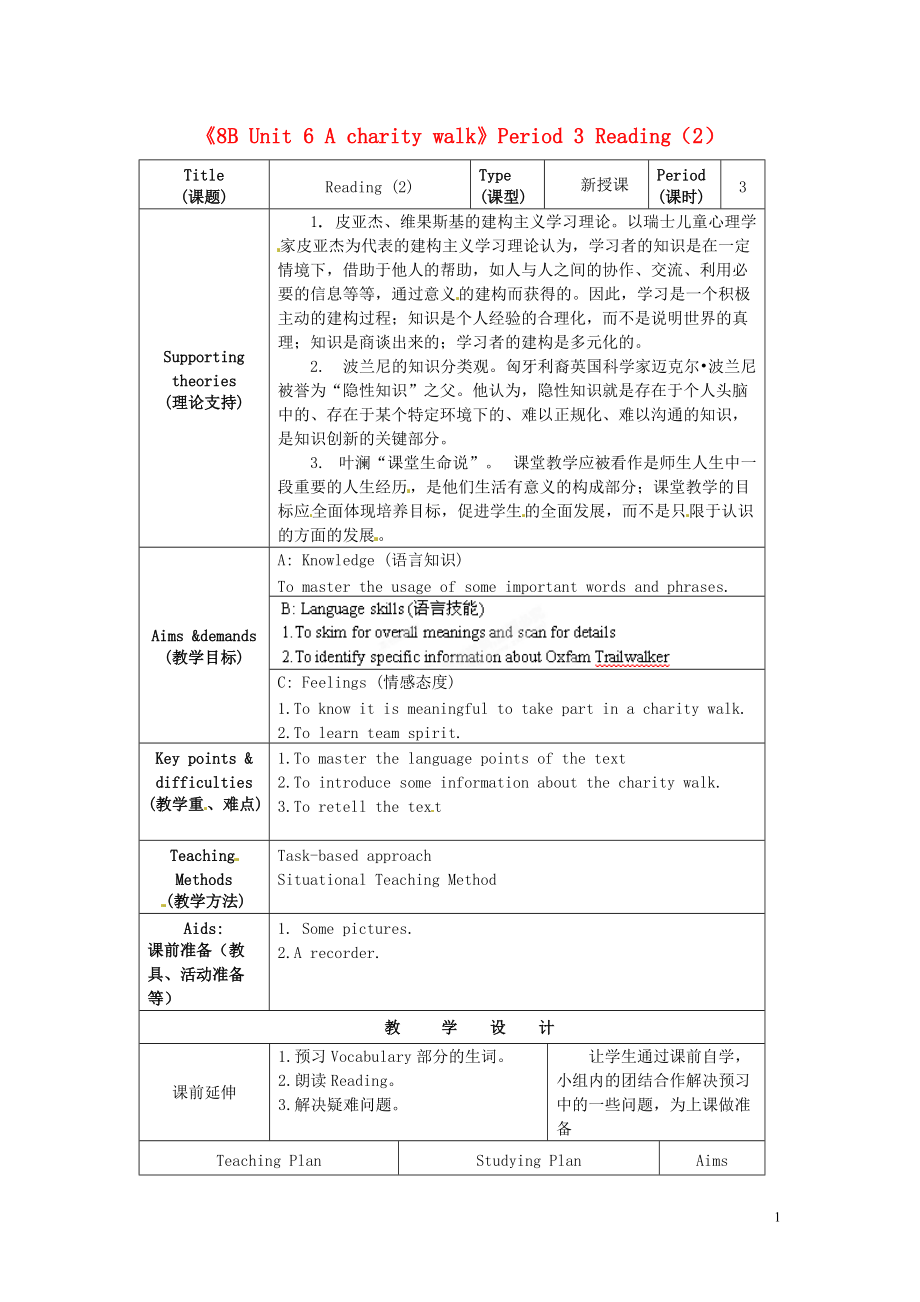《初級(jí)中學(xué)八年級(jí)英語下冊(cè)《8B Unit 6 A charity walk》Period 3 Reading(2)教案 牛津版》由會(huì)員分享,可在線閱讀�����,更多相關(guān)《初級(jí)中學(xué)八年級(jí)英語下冊(cè)《8B Unit 6 A charity walk》Period 3 Reading(2)教案 牛津版(3頁珍藏版)》請(qǐng)?jiān)谘b配圖網(wǎng)上搜索。
1�、
《8B Unit 6 A charity walk》Period 3 Reading(2)
Title
(課題)
Reading (2)
Type
(課型)
新授課
Period
(課時(shí))
3
Supporting theories
(理論支持)
1. 皮亞杰、維果斯基的建構(gòu)主義學(xué)習(xí)理論���。以瑞士兒童心理學(xué)家皮亞杰為代表的建構(gòu)主義學(xué)習(xí)理論認(rèn)為����,學(xué)習(xí)者的知識(shí)是在一定情境下�,借助于他人的幫助,如人與人之間的協(xié)作��、交流����、利用必要的信息等等���,通過意義的建構(gòu)而獲得的��。因此�,學(xué)習(xí)是一個(gè)積極主動(dòng)的建構(gòu)過程���;知識(shí)是個(gè)人經(jīng)驗(yàn)的合理化����,而不是說明世界的真理��;知識(shí)是商談出來的����;學(xué)習(xí)者的建
2、構(gòu)是多元化的��。
2. 波蘭尼的知識(shí)分類觀�。匈牙利裔英國科學(xué)家邁克爾?波蘭尼被譽(yù)為“隱性知識(shí)”之父。他認(rèn)為���,隱性知識(shí)就是存在于個(gè)人頭腦中的���、存在于某個(gè)特定環(huán)境下的、難以正規(guī)化�����、難以溝通的知識(shí),是知識(shí)創(chuàng)新的關(guān)鍵部分���。
3. 葉瀾“課堂生命說”���。 課堂教學(xué)應(yīng)被看作是師生人生中一段重要的人生經(jīng)歷,是他們生活有意義的構(gòu)成部分����;課堂教學(xué)的目標(biāo)應(yīng)全面體現(xiàn)培養(yǎng)目標(biāo),促進(jìn)學(xué)生的全面發(fā)展��,而不是只限于認(rèn)識(shí)的方面的發(fā)展���。
Aims &demands
(教學(xué)目標(biāo))
A: Knowledge (語言知識(shí))
To master the usage of some important words and ph
3���、rases.
C: Feelings (情感態(tài)度)
1.To know it is meaningful to take part in a charity walk.
2.To learn team spirit.
Key points & difficulties
(教學(xué)重、難點(diǎn))
1.To master the language points of the text
2.To introduce some information about the charity walk.
3.To retell the text
Teaching Methods
(教學(xué)方法
4�、)
Task-based approach
Situational Teaching Method
Aids:
課前準(zhǔn)備(教具���、活動(dòng)準(zhǔn)備等)
1. Some pictures.
2.A recorder.
教 學(xué) 設(shè) 計(jì)
課前延伸
1.預(yù)習(xí)Vocabulary部分的生詞����。
2.朗讀Reading。
3.解決疑難問題����。
讓學(xué)生通過課前自學(xué),小組內(nèi)的團(tuán)結(jié)合作解決預(yù)習(xí)中的一些問題���,為上課做準(zhǔn)備
Teaching Plan
(授課計(jì)劃)
Studying Plan
(學(xué)習(xí)計(jì)劃)
Aims
(設(shè)計(jì)意圖)
課
5��、
內(nèi)
探
究
學(xué)
StepⅠWarm up & Revision
1.Students read the text together.
2.Talk about the information of a charity walk. Making a flow chart about Oxfam Trailwalker
溫故知新���,自然導(dǎo)入���。
導(dǎo)
Step II Presentation
1.The students tell the teacher di
6、fficult points they don’t understand.
2.The teacher explains the difficult points.
1) It’s necessary for you to…
2) It’s useful to…
3) It is necessary that…
4) have sb. to do sth.
5)be used to do
6)try one’s best to do sth.
7)Why not do…?
學(xué)生自主學(xué)習(xí)��,發(fā)現(xiàn)問題����。
練
Step ⅢPractice
1.Complete Ex
7、ercise C on page 97
2.Do the additional exercise
及時(shí)鞏固����,強(qiáng)化反饋��。
Step ⅣProduction
Discuss in groups
If you are over 18, will you join the charity walk? Why? What will you do for the walk? How
寓德于教����。
課
后
提
升
Step ⅤAssignment
1. Retell the text.
2.《課本配套練習(xí)》P188 Period Three
3.Write an article about the discussion
布置學(xué)生適量的作業(yè),既落實(shí)了雙基����,又重視學(xué)生知識(shí)面的拓寬和能力的提升����。
3
 初級(jí)中學(xué)八年級(jí)英語下冊(cè)《8B Unit 6 A charity walk》Period 3 Reading(2)教案 牛津版
初級(jí)中學(xué)八年級(jí)英語下冊(cè)《8B Unit 6 A charity walk》Period 3 Reading(2)教案 牛津版

